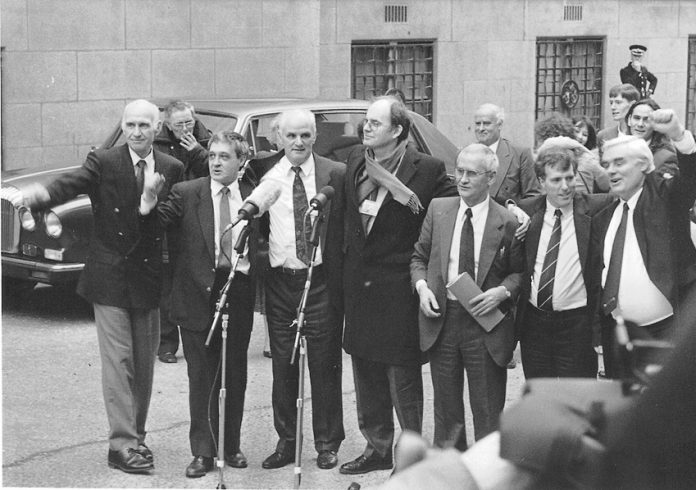
ONE of the Birmingham Six, wrongly convicted of the Birmingham pub bombings in 1975, branded the British legal system as unable ‘to spell the word justice’, declassified government documents reveal.
Paddy Hill added that successive Irish governments abandoned the Birmingham Six in their fight for freedom to please the British government. His assessment was revealed in a handwritten letter, from his cell in HMP Gartree on 10 September 1987.
The note, laden with anger, said they were offered nothing but false hope. Hill’s two-page letter to Senator Paschal Mooney, and forwarded on to the Department of Foreign Affairs, was released by the National Archives along with other files relating to the case under the 30-year rule.
The Birmingham Six – Paddy Hill, Hugh Callaghan, Gerard Hunter, Richard McIlkenny, William Power and John Walker – were wrongly jailed for life in 1975 for the IRA bombings which killed 21 people. Their convictions were eventually quashed in the appeal court and they were released in 1991.
In his letter, Hill said: ‘The British system don’t know how to spell the word JUSTICE never mind dispensing it.’ He repeated the words outside the Old Bailey, on the day the men were released. At the time of the letter, Hill had served 12 years in prison and had been in jail while four different Taoiseach (Irish prime ministers) took office – Liam Cosgrave, Jack Lynch, Garret FitzGerald and Charles Haughey.
Hill also damned the Irish government. ‘The only thing successive Irish Governments have done is help to keep innocent Irishmen in prison,’ he wrote. ‘The only thing they have done for us is to give us false hope and false promises.’
Another of the Birmingham Six, Richard McIlkenny, wrote to the Government from Wormwood Scrubs on 22 August 1987. He warned an extradition treaty between the UK and Ireland was a ‘grave mistake’ while they were still in prison.
‘Justice cannot be bought. If this extradition treaty is signed on December 1 then I feel strongly that we and the other innocents can say goodbye to any chances of freedom no matter how strong the evidence on our behalf,’ he said.
THATCHER WANTED TO CONTINUE POLL TAX
EX-TORY PM Margaret Thatcher clashed with her successor John Major over his handling of the economy, just weeks after she resigned as prime minister, government files reveal. The National Archives’ document shows the pair had a heated discussion in January 1991.
Thatcher warned Major that he was on the verge of making an ‘historic error’ about interest rates.
She was also angry about his plans to abandon the poll tax which had caused massive riots and brought about her downfall.
Major wrote to Thatcher on Boxing Day 1990 and invited her to a meeting where they might air, and resolve, their differences. During the meeting, which took place in Major’s room in the House of Commons on 3 January 1991, Thatcher warned that ‘excessively high’ interest rates risked pushing the UK’s economy into recession.
She compared the position to Winston Churchill’s decision as chancellor in 1925 to fix the parity of the pound at a high level. This led to deflation, mass unemployment and the General Strike. Her warning came 20 months before Black Wednesday when sterling crashed out of the ERM (European exchange mechanism).
In a confidential note of the meeting for the record, principal private secretary Andrew Turnbull wrote: ‘Mrs Thatcher said conditions in the economy were very tough indeed, and she urged early and large cuts in interest rates.
‘A reduction of 1% would not be enough. She believed there was a danger of a mirror image of “Lawson” inflation – a recession created by excessively high interest rates created by a policy of targeting exchange rates (though she did not mention the ERM explicitly). She believed there was some danger of repeating Winston Churchill’s historic error of fixing the parity for the pound at too high a level.’
In the event, Britain spent more than £6bn on 16 September 1992 trying and failing to keep the pound within the ERM’s narrow foreign exchange limits. The declassified documents also contain a secret note omitted from official documents recalling discussions between the then British Foreign Secretary Douglas Hurd and US Secretary of State James Baker on July 17, 1991.
According to the note, both countries were weighing up the possibility of continuing the war against Saddam Hussein after his forces had already been expelled from Kuwait. The document makes clear the British enthusiasm for joining the Americans in an extension of the conflict, which the US did not want to undertake alone.
Operationally, the strikes would be carried out under US command, to which PM Major agreed. The discussions were acknowledged in a secret letter from the Ministry of Defence dated July 12. The primary concern of the US, according to the letter, was ‘the political burden-sharing that would be provided by the inclusion of UK (and French) aircraft,’ if military action was to continue.